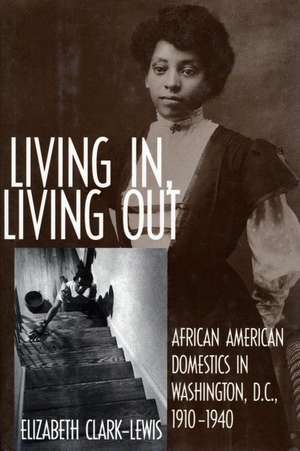Living In, Living Out: African American Domestics in Washington, D.C., 1910-1940
Autor Elizabeth Clark-Lewisen Limba Engleză Paperback – 30 iun 2010
With candor and passion, the women interviewed tell of leaving their families and adjusting to city life “up North,” of being placed as live-in servants, and of the frustrations and indignities they endured as domestics. By networking on the job, at churches, and at penny savers clubs, they found ways to transform their unending servitude into an employer-employee relationship—gaining a new independence that could only be experienced by living outside of their employers' homes. Clark-Lewis points out that their perseverance and courage not only improved their own lot but also transformed work life for succeeding generations of African American women. A series of in-depth vignettes about the later years of these women bears poignant witness to their efforts to carve out lives of fulfillment and dignity.
Preț: 200.60 lei
Nou
Puncte Express: 301
Preț estimativ în valută:
38.38€ • 40.18$ • 31.76£
38.38€ • 40.18$ • 31.76£
Carte indisponibilă temporar
Doresc să fiu notificat când acest titlu va fi disponibil:
Se trimite...
Preluare comenzi: 021 569.72.76
Specificații
ISBN-13: 9781588342867
ISBN-10: 1588342867
Pagini: 242
Ilustrații: 45 B&W PHOTOS
Dimensiuni: 152 x 226 x 18 mm
Greutate: 0.39 kg
Editura: Smithsonian Books (DC)
ISBN-10: 1588342867
Pagini: 242
Ilustrații: 45 B&W PHOTOS
Dimensiuni: 152 x 226 x 18 mm
Greutate: 0.39 kg
Editura: Smithsonian Books (DC)
Notă biografică
Elizabeth Clark-Lewis is director of the Public History Program at Howard University and co-producer of the award-winning video Freedom Bags.
Recenzii
“This vivid tale of social transformation is original; the interview material is stunning. No one else has the richness of data about women making the transition from rural to urban, agricultural to industrial, southern to northern, family-dominated to individual-directed life. This is an extraordinarily rich account of a group of women in the very process of making these shifts basic to the creation of our urban, individualistic world. That they are African American women domestics makes the story even more striking and delicious.”—Phyllis Palmer, author of Domesticity and Dirt
Textul de pe ultima copertă
This oral history portrays the lives of African American women who migrated from the rural South to work as domestic servants in Washington, D.C., in the early decades of this century. In Living In, Living Out, Elizabeth Clark-Lewis narrates the personal experiences of eighty-one women who worked for wealthy white families. These women describe how they encountered - but never accepted - the master-servant relationship, and recount the strategies they used to change their status from "live in" servants to daily paid workers who "lived out". Clark-Lewis describes the women's roots in the rural South, where limited prospects encouraged African American families to plan their daughters' migration to northern cities. While still very young, girls were trained to do household chores; as they got older, "traveling talk" began to prepare them to survive in the world of white employers. After an elaborate search for places to live with northern kin, girls were sent off with familiar folk rituals: they were given charms for good luck, blessings from the church, and fetishes for remembrance. With candor and passion, the women interviewed tell of adjusting to city life "up North", of being placed as live-in servants, and of the frustrations and indignities they endured as domestics. By networking on the job with laundresses and at churches and penny savers clubs, they found ways to transform the master-servant relationship into an employer-employee relationship. Clark-Lewis points out that their perseverance and courage not only improved their own lot but also transformed work life for succeeding generations of African American women. A series of in-depth vignettes about the later years of thesewomen bears poignant witness to their efforts to carve out lives of fulfillment and dignity.
